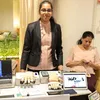As a woman in a man’s world, you have to fight for your right to participate on an equal footing, says Cherie Blair
Cherie Blair, lawyer, wife of former British Prime Minister, Tony Blair, and Founder of the Cherie Blair Foundation for Women is working towards improving the economic conditions of women all over the world.
Leading Queen’s counsel, former British first lady and an ardent campaigner of women’s and girl’s rights – Cherie Blair dons several hats.
She is however well-known as the Founder of the Cherie Blair Foundation for Women, she set up in 2008 to help women build small and growing businesses in low and middle-income countries and empower them to play active roles in the economies of their countries.
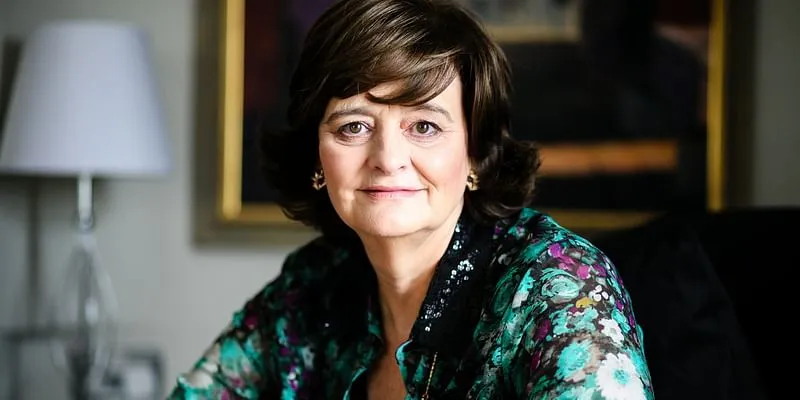
As an ambassador for women entrepreneurs, Cherie travels all over the world encouraging non-profits, corporate entities and governments to encourage and support women.
When we talk about an egalitarian society, emancipation and respect for women should rank high in its list of priorities. In a conversation with HerStory, Cherie reveals, “In its last Global Gender Gap Report, the World Economic Forum predicted it will take 257 years before women are able to participate in the economy equally as men.”
Despite this pessimistic outlook, Cherie urges women to “continue to fight until our gender no longer limits our opportunities – for ourselves and for generations to come”.
Her own life demonstrates this enthusiasm and steadfast commitment to go the extra mile inspite of challenges.
Her life has been one of struggle; her father left her mother when she was just five years old. While she was studying law, as a woman, she faced numerous biases.
While all that might have been in the past, the experiences have undoubtedly helped her to work towards improving the economic conditions of women not only in the UK, but throughout the world.
In an exclusive interview with HerStory, Cherie Blair speaks about women’s empowerment, the role of the Foundation, and living in uncertain times following COVID-19.
Here are some edited excerpts from the interview:
HerStory: What has been the most defining moment of your life?
Cherie Blair: Looking back, it’s very hard to pick a defining moment. I could choose the opportunities that came my way, such as the 40 years I’ve spent as a barrister, and also the period of time when I was the wife of the Prime Minister. Both of these enabled me to meet many great women who have inspired me.
However, if I had to choose a defining moment, it would be at the end of my legal training when I was told that I was not going to be offered a permanent place at my law firm. There were two candidates, myself and a young man, and they chose the man, implying that at a time when there were very few women at the Bar, he was a safer bet. I realised then it was not enough even to have come first in the Bar exams, but as a woman in a man’s world you had to fight for your right to participate on an equal footing. I have been fighting for that right for myself and for other women ever since!
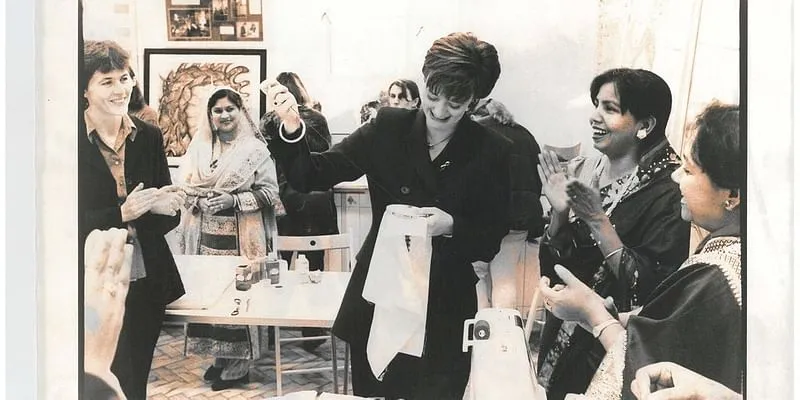
"It’s absolutely vital that we invest in women and create a global business ecosystem that is truly gender equal."
HS: How did you manage to step out of your husband's shadow and carve an identity of your own, especially in the field of women’s empowerment?
CB: Well, the young man who was preferred over me was Tony. And of course, he was the one who then gave up law to forge an amazing political career. The law firm had been wrong. I was the one who was committed to the law, and Tony and I have pursued our careers in parallel ever since.
When my husband became Prime Minister it was assumed I would give up my career, but by then, having spent 20 years in my profession, and been one of the very few women to become a Queen’s Counsel, I was determined to continue as a working mum, like my own mother and so many other women in the UK at the time.
But I was determined too to make the most of my role as the wife of the Prime Minister. So during those 10 years I was lucky enough to meet many women from a host of different backgrounds, often from low and middle income countries, who were striving to set up businesses to create better lives for themselves and their families. All of them faced a huge number of barriers in realising their business ideas. Many were operating in isolated areas, far from the services and infrastructure that we take for granted. Some faced resistance from family members and nearly all of them struggled to access the finance they needed to grow their enterprises.
Yet, despite these hurdles, they refused to take no for an answer. I soon realised that with the right support and the right tools, these women could go on to achieve amazing things.
So in 2008, I established the Cherie Blair Foundation for Women.
Our mission is to empower women entrepreneurs in low and middle income economies to start, grow and sustain successful businesses - so they can redefine the future for themselves and play a stronger role in their families, communities and society.
HS: We saw #MeToo movement gaining momentum in the last couple of years. What are the other battles women have had to fight to achieve equal status with men?
CB: First the good news - maternal health and girls’ education are both improving. We are making slow progress on political participation and women’s leadership, and we are beginning to measure pay gaps and other gender indicators. #MeToo, #TimesUp and movements to stop violence are gaining attention. And International Women’s Day has become a media highlight in our calendars when women’s issues rise up the agenda.
But the bad news is that progress on women’s economic equality is not just excruciatingly slow – we are going backwards. In its last Global Gender Gap Report, the World Economic Forum predicted it will take 257 years before women are able to participate in the economy equally to men. Why is that?
Women dominate unskilled factory jobs that are being automated. They do not have the STEM education to get the highly paid jobs in growing sectors, and the burden they carry of unpaid care – up to ten times that of men - pushes them out of paid work. They also face legal and social restrictions in most countries.
We have to accelerate the rate of progress, something I feel even more strongly now I have a three-year old-granddaughter.
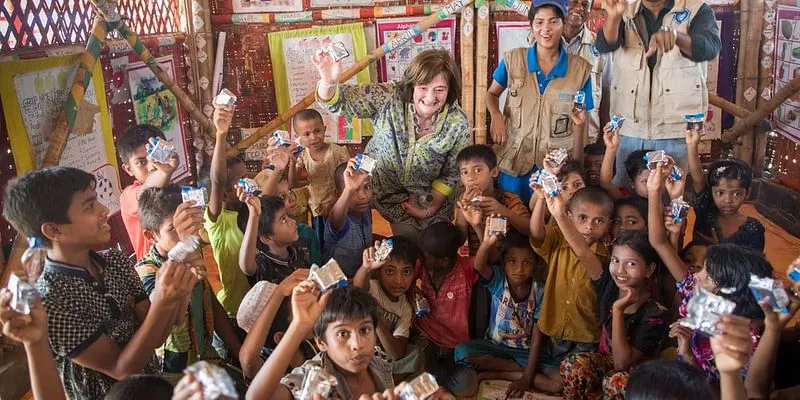
"We have to accelerate the rate of progress, something I feel even more strongly now I have a three-year old-granddaughter."
HS: What have been some of your key observations from your work with the Cherie Blair Foundation for Women?
CB: Women working with the Cherie Blair Foundation aren’t just entrepreneurs – they are pioneers, role models and change-makers.
Every day, I witness women working to educate, to improve themselves and prosper, not just for themselves but for their families and their communities. Since 2008 we have helped over 160,000 women from over 100 countries, and by 2022 we aim to help 100,000 more with our 100,000 women campaign.
Our focus is on building women’s capacity as entrepreneurs and improving their access to resources. Through our pioneering global online mentoring programme, our award-winning mobile apps, and our online and face-to-face training delivered with our partners in each country, women entrepreneurs are supported to gain the vital business skills and confidence they need.
Our programmes enable women to access the key drivers of business success - finance, knowledge, networks, and markets. For the last 10 years, since we published a ground-breaking report with the Global System for Mobile Communications Association (GSMA) on the gender gap in mobile phone usage, we have also been working to create a more enabling ecosystem for women in business.
HS: How can we translate women’s empowerment into generation of wealth?
CB: We don’t yet know what could be accomplished if women and girls had equality, because no country in the world has achieved it. But research suggests the potential for social change and economic development is on a scale beyond our imagination.
Harnessing the incredible talents and potential of women will create a stronger economy and a more peaceful, healthier, sustainable, world for all. Involving women in peace processes make peace more likely to hold; increasing gender balance in corporate boards improves returns; women with financial independence improve their family’s life chances.
In 2015, the McKinsey Global Institute estimated that if women were to play an identical role in labour markets compared to men, an extra 12 trillion dollars would be added to the global economy by 2025.
The Cherie Blair Foundation for Women’s research with Boston Consulting Group last year found if women entrepreneurs could participate equally with male entrepreneurs it could add up to five trillion dollars to global GDP.
These are eye-watering economic opportunities. The business case is clear. Beyond these statistics, the fact remains – women and girls have the right to enjoy an equal role in society. But behind the denial of this right lies deeply embedded discrimination.
Discrimination is wrong in all its forms and an affront to the dignity of all of us as human beings. When women anywhere are being held back it is holding us all back.
HS: What is your message for the women of today?
CB: We have so much to offer as entrepreneurs, leaders, and as mentors. I’m sure many of you are already doing so much to celebrate and advance women in your own lives and communities. We must continue to fight until our gender no longer limits our opportunities – for ourselves and for generations to come.
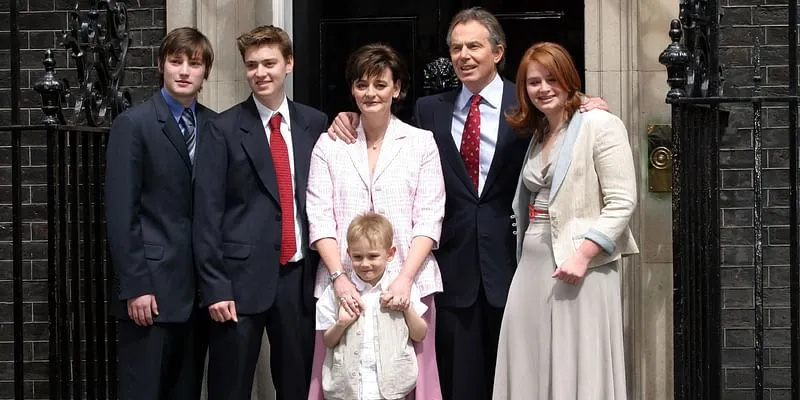
"We must continue to fight until our gender no longer limits our opportunities – for ourselves and for generations to come."
(Source- The Sun)
HS: COVID- 19 has brought the world to a standstill and has also brought to light the pitiable conditions women are living in worldwide… What are your thoughts on this?
CB: These are, of course, incredibly difficult times as we adjust to this unprecedented crisis. When we look to the future, as we start to rebuild the global economy, it’s absolutely vital that we invest in women and create a global business ecosystem that is truly gender equal.
The Cherie Blair Foundation for Women has been surveying the women in our programmes to understand its impacts on themselves and their businesses. We are looking at how we can both adapt our offer and advocate on their behalf to ensure they are supported through this – so their businesses, livelihoods and families can survive and thrive beyond the crisis.
I’ve been truly touched by the phenomenal outpouring of support and philanthropy from companies, institutions and individuals like yourselves at this time. So please continue to join us on our mission to create a strong, positive, more equal future together.
Support our campaign, and help our incredible women entrepreneurs take that leap to a better tomorrow for their families, their communities, and the world.
Edited by Rekha Balakrishnan




